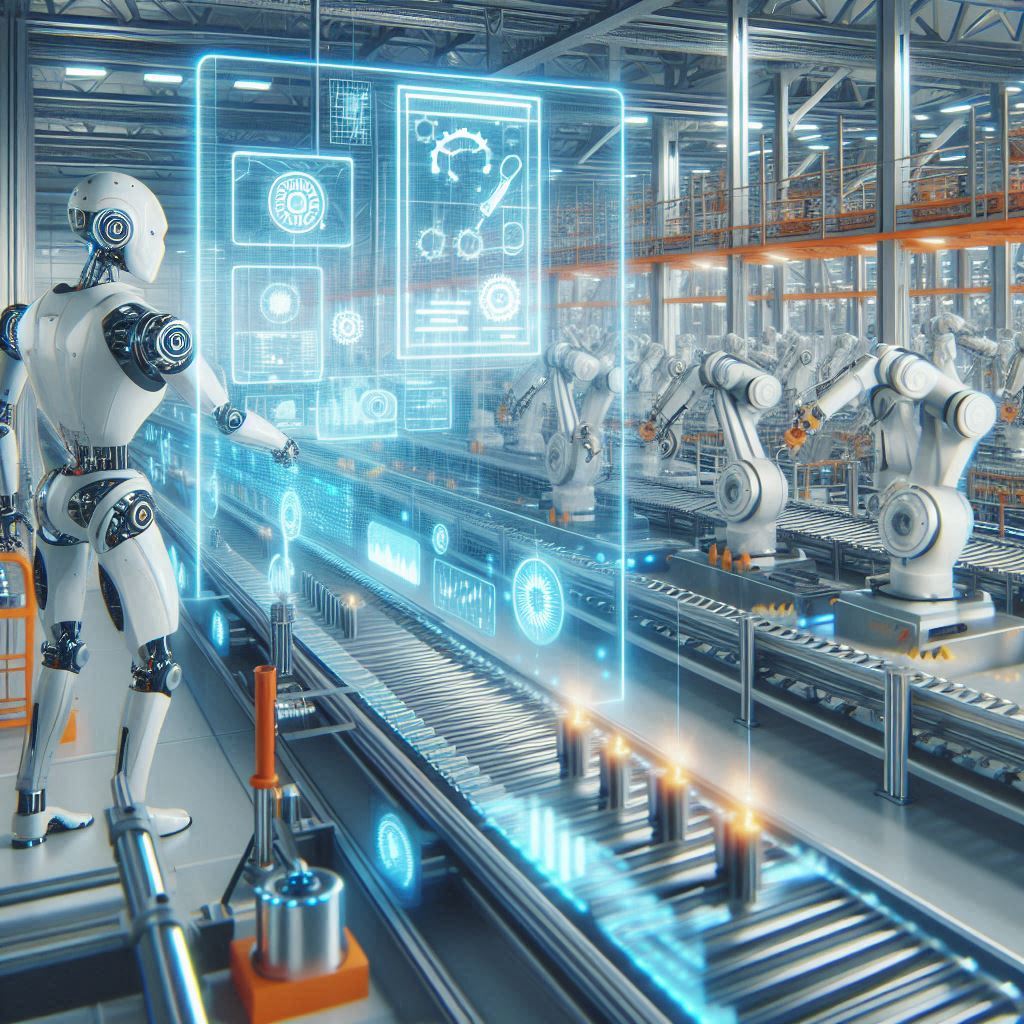Artificial Intelligence (AI) is transforming the manufacturing industry by enabling automation, improving operational efficiency, and driving innovation. As AI technologies continue to evolve, they are shaping the future of manufacturing, creating new opportunities, and addressing various industry challenges. This article explores the trends shaping AI in manufacturing, market growth projections, top companies, regional analysis, opportunities, challenges, and industry segmentation.
Trends Shaping the Future of Artificial Intelligence in Manufacturing Industry
- Smart Automation and Robotics
AI-powered robotics and automation systems are becoming smarter, enabling manufacturers to optimize production processes. These systems can adapt to real-time changes, reducing downtime and improving efficiency. - Predictive Maintenance
AI algorithms are being used for predictive maintenance, where machines can predict potential failures before they occur. This trend reduces equipment downtime and maintenance costs while enhancing productivity. - Quality Control and Inspection
AI is being used to improve quality control processes through visual recognition and machine learning. Automated inspection systems can detect defects and ensure products meet the highest standards, minimizing human errors. - Supply Chain Optimization
AI is revolutionizing supply chain management by optimizing demand forecasting, inventory management, and logistics. AI models can analyze data to enhance decision-making, reducing costs and improving overall supply chain efficiency. - AI-driven Product Design
AI is increasingly being utilized in product design, where it helps in simulations, virtual testing, and optimizing designs for manufacturability, reducing the time and cost involved in product development.

Artificial Intelligence in Manufacturing Market Growth Projection
The global Artificial Intelligence in Manufacturing Market is expected to reach USD 20.8 billion by 2028 from USD 3.2 billion in 2023, at a CAGR of 45.6% during 2023–2028. This surge is driven by increasing adoption of smart manufacturing techniques, automation, and advancements in AI technologies. By 2030, the market is projected to reach billions in revenue, with North America and Asia-Pacific being the dominant regions.
Top Companies in Artificial Intelligence in Manufacturing Industry
Several leading companies are investing heavily in AI for manufacturing, including:
- Siemens
Siemens has integrated AI into its digital factories, offering smart manufacturing solutions that leverage data analytics, robotics, and automation. - IBM
IBM’s Watson AI platform is used for predictive maintenance, quality control, and supply chain optimization in manufacturing, helping companies enhance operational efficiency. - General Electric (GE)
GE has embraced AI through its industrial IoT platform, Predix, which helps manufacturers use AI to predict equipment failures, reduce downtime, and improve productivity. - ABB
ABB is a leader in industrial robotics and AI-driven automation, offering innovative AI-powered solutions for the manufacturing sector. - Microsoft
Microsoft’s Azure AI services are widely used by manufacturers to implement smart factories, predictive analytics, and machine learning algorithms for various industrial applications.
Regional Analysis of Artificial Intelligence in Manufacturing
- North America
The region is expected to hold a significant share of the AI in manufacturing market, driven by technological advancements, widespread automation, and high investment in AI-powered manufacturing solutions. - Asia-Pacific
Asia-Pacific is anticipated to grow at the highest rate due to the strong manufacturing base in countries like China, Japan, and South Korea. The rise of smart factories and the region’s focus on Industry 4.0 initiatives contribute to market growth. - Europe
Europe is also seeing rapid adoption of AI in manufacturing, with Germany leading the region’s efforts to integrate AI into industrial processes, especially within the automotive sector.
Opportunities in the Artificial Intelligence in Manufacturing Industry
- Increased Adoption of Industry 4.0
As more manufacturers embrace Industry 4.0 principles, there is a growing demand for AI-driven technologies to enhance factory automation, data-driven decision-making, and connected systems. - Innovation in Custom Manufacturing
AI opens up new possibilities for custom manufacturing by using machine learning to adjust production lines in real-time based on demand and specific customer requirements. - Sustainability and Energy Efficiency
AI is playing a crucial role in optimizing energy consumption in manufacturing, leading to more sustainable practices and reducing overall carbon footprints.
Challenges Facing the Artificial Intelligence in Manufacturing Industry
- High Implementation Costs
Adopting AI technologies requires significant investment in infrastructure, software, and expertise. Many small to medium-sized enterprises (SMEs) face financial barriers when integrating AI into their manufacturing processes. - Lack of Skilled Workforce
AI deployment in manufacturing requires specialized knowledge in data science, machine learning, and robotics. The current shortage of skilled AI professionals poses a challenge for manufacturers looking to adopt these technologies. - Data Privacy and Security Concerns
With AI relying heavily on data, concerns about data privacy, security breaches, and intellectual property rights are increasing, particularly as manufacturers collect vast amounts of sensitive information.
Artificial Intelligence in Manufacturing Industry Segmentation
- By Technology
- Machine Learning
- Computer Vision
- Natural Language Processing (NLP)
- Context-Aware Computing
- By Application
- Predictive Maintenance
- Quality Control
- Production Planning
- Supply Chain Optimization
- By End-User
- Automotive
- Electronics
- Pharmaceuticals
- Aerospace & Defense
- Food & Beverage
- By Region
- North America
- Europe
- Asia-Pacific
- Latin America
- Middle East & Africa
The future of artificial intelligence in the manufacturing industry is bright, with AI driving significant improvements in operational efficiency, product quality, and innovation. While challenges such as high implementation costs and a lack of skilled professionals remain, the opportunities for growth, sustainability, and advanced automation make AI an essential part of the modern manufacturing landscape. As AI continues to evolve, it will reshape manufacturing, leading to smarter factories and more efficient production processes globally.
